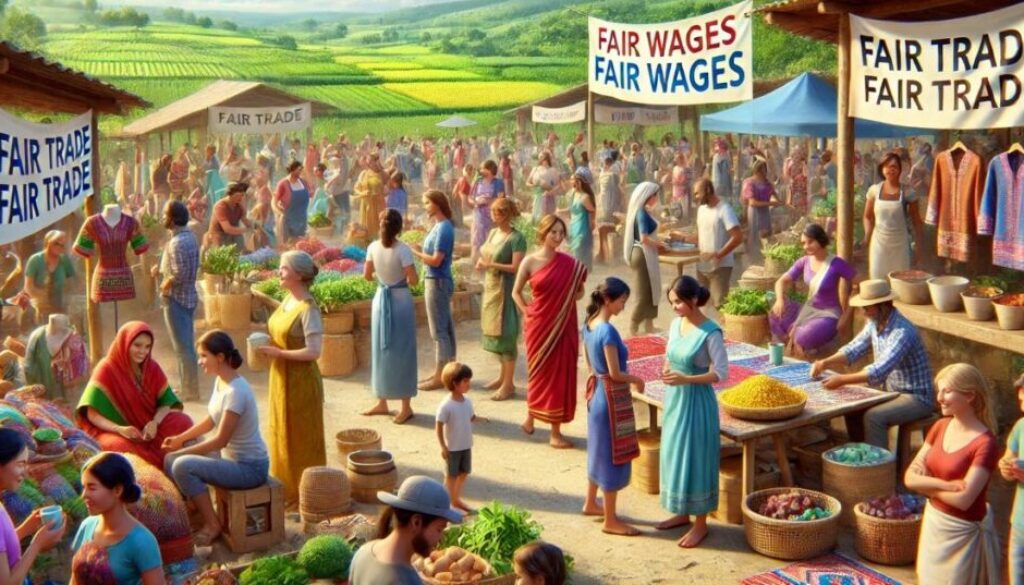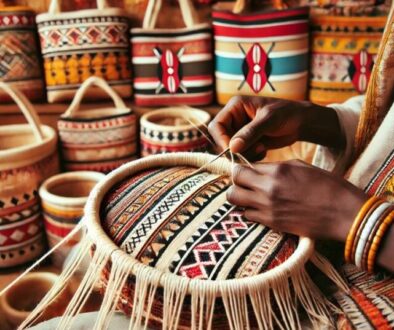Fair Wages and Gender Equality in Fair Trade
In Fair Trade, ensuring fair wages and gender equality is not just a mere goal but a necessity in creating a world where every individual is treated with dignity and respect. As we explore into the importance of fair wages and gender equality in fair trade practices, we recognize the power that lies within each of us to demand equality and justice for all workers, regardless of their gender. Let us launch on this journey together to empower equality and create a more just and equitable world for every individual involved in fair trade.
What You Will Learn From This Article:
- Fair wages: Fair trade focuses on ensuring fair wages for workers, particularly in developing countries, to help lift them out of poverty and improve their standard of living.
- Empowering women: Fair trade plays a crucial role in empowering women by providing them with equal opportunities for work, education, and leadership positions.
- Promoting gender equality: Fair trade organizations work towards promoting gender equality by addressing issues of discrimination, harassment, and unequal opportunities in the workplace.
- Supporting sustainable practices: Fair trade principles include promoting environmentally sustainable practices to protect the planet for future generations.
- Consumer awareness: Raising consumer awareness about fair trade practices and the importance of supporting companies that prioritize fair wages and gender equality is key to driving positive change in the industry.
The State of Fair Trade
The Global Fair Trade Market
On the journey towards fair wages and gender equality in fair trade, it’s crucial to understand the current state of the global fair trade market. Fair trade has grown significantly over the years, with consumers increasingly seeking out products that are ethically produced and support marginalized communities. This movement has brought attention to the importance of fair wages, safe working conditions, and environmental sustainability in supply chains.
Current Challenges and Inequalities
Global fair trade still faces challenges and inequalities that hinder progress towards gender equality and fair wages. Women continue to be disproportionately affected by low wages, lack of access to training, and limited leadership opportunities within fair trade organizations. This perpetuates a cycle of inequality that must be addressed to truly empower women and ensure fair treatment for all workers.
To truly achieve gender equality and fair wages in fair trade, it’s crucial to address these challenges head-on. By advocating for policies that promote fair wages, provide equal opportunities for women, and prioritize gender equality in fair trade practices, we can create a more equitable and sustainable future for all workers involved in the global supply chain.
The Importance of Fair Wages
The Impact on Local Communities
Wages play a crucial role in fair trade practices as they directly impact the livelihoods of local communities. When workers receive fair wages for their labor, they are empowered to provide better opportunities for themselves and their families. Fair wages lead to improved living conditions, access to education, healthcare, and overall well-being.
Breaking the Cycle of Poverty
One of the significant benefits of fair wages in fair trade is their ability to break the cycle of poverty. By ensuring that workers are paid fairly for their work, they can lift themselves out of poverty and create a sustainable path towards economic stability. Fair wages enable individuals to invest in their future, breaking the cycle of poverty for generations to come.
This sustainable approach not only benefits the individuals receiving fair wages but also has a ripple effect on the community as a whole. When fair wages are paid, communities thrive, leading to economic growth and stability.
Empowering Small-Scale Farmers
Breaking the cycle of poverty and empowering small-scale farmers go hand in hand in fair trade practices. By ensuring fair wages for farmers, they are equipped with the resources needed to invest in sustainable farming practices, access resources for improved crop yields, and expand their market reach. Fair wages empower farmers to take control of their livelihoods and build a better future for themselves and their communities.
The empowerment of small-scale farmers through fair wages not only promotes economic stability but also fosters a sense of pride and dignity in their work. When farmers are paid fairly, they are more motivated to continue their efforts towards sustainable agriculture and community development.
Gender Equality in Fair Trade
The Role of Women in Fair Trade
Not only do women play a vital role in fair trade, but they are often the backbone of many fair trade initiatives. Women make up a significant portion of the workforce in fair trade organizations, working as artisans, farmers, and producers. Their contributions are crucial to the success of fair trade enterprises, yet they are often faced with numerous challenges such as limited access to resources, lower wages compared to men, and lack of decision-making power.
Addressing Gender-Based Discrimination
Role Not only is addressing gender-based discrimination crucial for creating a more equitable and inclusive fair trade system, but it is also crucial for upholding the principles of fairness and justice. By actively working to eliminate discriminatory practices and providing equal opportunities for both men and women, fair trade organizations can create a more sustainable and empowering environment for all individuals involved.
Equality Gender-based discrimination can manifest in various forms, including unequal pay, limited access to training and education, and lack of representation in leadership positions. By addressing these issues head-on and implementing policies that promote gender equality, fair trade can become a powerful force for positive change and empowerment.
Promoting Women’s Economic Empowerment
To truly empower women in fair trade, it is crucial to provide them with the tools, resources, and opportunities they need to thrive. By promoting women’s economic empowerment through initiatives such as skills training, access to credit, and leadership development programs, fair trade can help women break the cycle of poverty, improve their standard of living, and achieve financial independence.
Empowerment By actively promoting women’s economic empowerment, fair trade not only benefits women themselves but also their families and communities. When women have access to equal opportunities and resources, they can contribute more effectively to the economy, drive social progress, and inspire future generations to pursue their dreams and aspirations.
Barriers to Equality
Cultural and Social Norms
Cultural and social norms can act as significant barriers to achieving equality in fair trade. Traditional gender roles and stereotypes may limit opportunities for women, leading to unequal pay and representation in decision-making processes. In some communities, women are expected to prioritize household responsibilities over pursuing careers, making it challenging for them to access economic opportunities.
Limited Access to Education and Training
The lack of access to education and training is another barrier that hinders gender equality in fair trade. Limited educational opportunities for women can prevent them from acquiring the necessary skills and knowledge to engage in fair trade businesses. Without proper training, women may find it difficult to compete in the market and negotiate fair wages for their products.
It is vital to address these barriers by providing educational initiatives and skills training programs specifically tailored to women in fair trade. By equipping women with the tools they need to succeed in the industry, we can empower them to break free from traditional limitations and advocate for fair wages and gender equality.
Lack of Representation and Voice
Women’s lack of representation and voice in decision-making processes within fair trade organizations can further perpetuate inequality. When women are not included in leadership positions or decision-making roles, their perspectives and needs may be overlooked, leading to policies and practices that do not adequately address gender equality concerns.
Limited representation also impacts women’s ability to advocate for fair wages and equal opportunities within the fair trade sector. By promoting inclusivity and amplifying women’s voices in leadership positions, we can ensure that their concerns are heard and acted upon, leading to a more equitable and empowering fair trade environment.
Strategies for Change
Implementing Fair Wage Policies
With the goal of promoting fair wages in fair trade, it is crucial to implement policies that ensure workers are compensated fairly for their labor. Fair trade organizations can work closely with producers to establish transparent and equitable wage structures that consider the cost of living in the local communities where the goods are produced. By setting minimum wage standards and providing opportunities for skill development and advancement, fair trade can help uplift workers and their families out of poverty.
Promoting Gender-Balanced Supply Chains
Wage disparities between men and women persist in many industries, including fair trade. To promote gender equality, it is vital to establish gender-balanced supply chains where women have equal opportunities for training, leadership roles, and decision-making. By investing in programs that empower women economically and socially, fair trade can create a more inclusive and diverse workforce that benefits everyone involved.
With a focus on promoting gender-balanced supply chains, fair trade organizations can partner with local women’s groups and organizations to provide support and resources that help women succeed in the industry. Training programs, mentorship opportunities, and access to financing can help women overcome barriers and achieve equal representation and leadership positions.
Supporting Women-Led Cooperatives
Fair trade can support women-led cooperatives by prioritizing their products, providing market access, and ensuring fair payment for their goods and services. By empowering women to collectively own and manage their businesses, fair trade can help break traditional gender roles, improve financial independence, and strengthen communities. Supporting women-led cooperatives not only benefits the women involved but also has a ripple effect on their families and communities, leading to greater economic stability and social progress.
Fair trade organizations can facilitate partnerships between women-led cooperatives and global markets, enabling these women entrepreneurs to showcase their products and connect with consumers who value ethical and sustainable practices. By amplifying the voices and contributions of women in fair trade, we can create a more just and equitable world for all.
Success Stories and Best Practices
Examples of Fair Trade Organizations
Stories of fair trade organizations like Ten Thousand Villages and Fair Trade USA show the impact of fair wages and gender equality in empowering communities worldwide. These organizations prioritize paying fair wages to artisans, many of whom are women, ensuring that their work is valued and respected. Through fair trade practices, these organizations have uplifted marginalized communities, providing them with sustainable livelihoods and opportunities for growth.
Effective Strategies for Empowering Women
Stories of successful strategies for empowering women in fair trade include providing access to education, skills training, and leadership opportunities. By investing in women’s education and providing them with the tools to succeed, fair trade organizations create a ripple effect of empowerment within communities. Women who are economically empowered are more likely to invest in their families and communities, breaking the cycle of poverty and inequality.
Empowering women in fair trade goes beyond providing them with job opportunities. It involves creating a supportive environment that values their contributions and promotes gender equality at all levels of the organization. By implementing gender-sensitive policies and practices, fair trade organizations can ensure that women have an equal voice in decision-making processes and are given the resources they need to thrive.
Measuring Progress and Impact
On the journey towards gender equality and fair wages in fair trade, measuring progress and impact is crucial. By collecting data on the number of women artisans employed, their income levels, and their level of participation in decision-making processes, organizations can track their impact and identify areas for improvement. This data-driven approach helps ensure that fair trade practices are truly empowering women and promoting gender equality in a meaningful way.
Women are at the forefront of the fair trade movement, driving positive change in their communities and advocating for their rights. By supporting women artisans and ensuring that they are paid fairly for their work, fair trade organizations contribute to the empowerment of women worldwide, creating a more equitable and just society for all.
Final Words
Hence, it is crucial that we continue to support fair trade practices that prioritize fair wages and gender equality. By choosing products that are Fair Trade certified, you are not only supporting sustainable and ethical practices but also ensuring that workers, especially women, are treated fairly and given equal opportunities. Your conscious choices have the power to make a difference in the lives of those who are often marginalized and disadvantaged in the global economy.
Do not forget, every purchase you make is a vote for the kind of world you want to live in. By supporting fair trade and advocating for gender equality, you are contributing to a more just and equitable society. Let us work together to empower equality and create a world where every individual is valued and respected, regardless of their gender or background.
FAQ
Q: What is fair trade?
A: Fair trade is a trading partnership that aims to promote greater equality and justice in international trade. It ensures fair wages and working conditions for producers in developing countries.
Q: How does fair trade promote gender equality?
A: Fair trade empowers women by providing them with equal opportunities for employment, leadership roles, and decision-making. It helps challenge gender stereotypes and promotes a more inclusive workforce.
Q: Why is fair wages important in fair trade?
A: Fair wages ensure that producers receive a decent income for their work, allowing them to support themselves and their families. It helps break the cycle of poverty and exploitation in vulnerable communities.
Q: How can consumers support fair wages and gender equality in fair trade?
A: Consumers can support fair trade by choosing products that carry the Fair Trade Certified label, which guarantees fair wages and gender equality standards. By making conscious purchasing decisions, consumers can help create a more equitable global economy.
Q: What are some challenges in ensuring fair wages and gender equality in fair trade?
A: Some challenges include lack of awareness among consumers, market competition that prioritizes low prices over fair practices, and cultural barriers that limit women’s participation in economic activities. Addressing these challenges requires ongoing advocacy, education, and collaboration among stakeholders in the fair trade movement.










